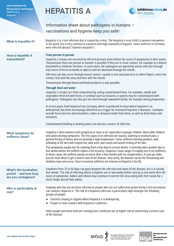Vaccination
Vaccinations against hepatitis A are available. Primary immunisation consists of two doses of a hepatitis A vaccine administered at an interval of 6 to 12 months. A single dose of vaccine provides comprehensive protection for 6 to 12 months. Combination vaccines with hepatitis B are also available, for which different vaccination schemes are possible.
The Standing Committee on Vaccination (STIKO) recommends vaccination for people at risk, in particular for:
- People at a high risk of infection due to their sexual behavior (for example, men who have sex with other men),
- People suffering from liver disease or diseases that affect the liver,
- People who receive frequent transfusions of blood components (for example, in the case of haemophilia),
- Drug users who use syringes,
- People undergoing treatment in psychiatric or similar care facilities,
- People at a greater risk of infection as a result of their work or voluntary activities (for example, healthcare professionals, employees in community institutions and those in contact with wastewater, for example in sewage treatment facilities and wastewater treatment plants),
- Travelers in regions where hepatitis A is widespread.
A hepatitis A vaccine can effectively prevent disease if given early after exposure to the virus.
People in contact with hepatitis A sufferers who are not yet protected by a hepatitis A vaccine and have not had a hepatitis A infection should be vaccinated as early as possible within the next 14 days. People at particular risk can also be passively immunized (administration of antibodies).
People at particular risk can also be passively immunized (administration of antibodies).







